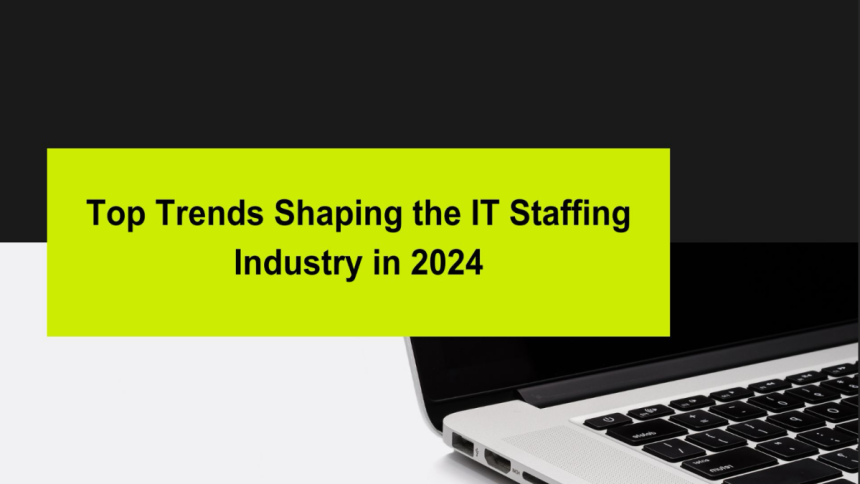In an era marked by rapid technological advancements and shifting workforce dynamics, the IT staffing industry stands at the forefront of transformation. As businesses globally adapt to these changes, understanding the emerging trends shaping this industry becomes crucial.
In 2024, these trends are set to redefine how IT recruitment agencies operate, affecting everything from talent acquisition strategies to the tools and technologies they employ. This blog explores the top trends influencing the IT staffing industry in 2024, offering insights into what businesses and IT professionals can expect in the evolving job market.
Navigating New Frontiers in IT Recruitment
As we move further into the decade, the IT staffing industry continues to evolve, driven by innovation and influenced by broader economic and technological shifts. Identifying these trends is not just about keeping up; it’s about staying ahead. For IT recruitment agencies looking to lead in 2024, understanding and adapting to these trends is essential for success. Let’s delve into the specific developments poised to shape the IT recruitment landscape in the coming year.
1. Increased Demand for Specialized IT Roles
The proliferation of advanced technologies such as artificial intelligence (AI), machine learning (ML), and the Internet of Things (IoT) is creating a surge in demand for specialized IT roles. IT recruitment agencies are increasingly seeking professionals who are not only tech-savvy but also specialists in these specific areas.
This trend is prompting agencies to refine their sourcing strategies to identify and attract niche talent, potentially driving up salaries and benefits for qualified candidates.
2. Remote Work as a Standard, Not a Perk
The remote work revolution, catalyzed by the global pandemic, has settled into a permanent fixture. In 2024, IT professionals expect remote work opportunities, making flexibility a standard offering rather than a special perk.
Recruitment strategies now emphasize a candidate’s ability to work effectively in remote settings, which includes assessing self-management skills and proficiency with digital collaboration tools. You might be surprised to know that surveys indicate over 65% of professionals prefer 100% remote recruitment offers.
3. Emphasis on Soft Skills
While technical acumen remains paramount, there is a growing emphasis on soft skills such as communication, teamwork, and problem-solving within the IT sector. IT recruitment agencies are increasingly evaluating these competencies as critical components of the hiring process.

Agencies are using innovative assessment tools and techniques to evaluate candidates’ soft skills, ensuring they fit the company culture and team dynamics.
4. Use of Advanced Analytics and AI in Recruitment
AI and analytics are revolutionizing the IT staffing industry by enabling more efficient candidate screening and selection processes. These technologies help in predicting candidate success, optimizing job matching, and streamlining administrative tasks.
Agencies are investing in AI-driven platforms that can analyze vast amounts of data to identify potential candidates more quickly and accurately. Nearly 85% of the managers who use AI in the recruitment process claim it to be time-saving with an improvement in the quality of hires by predicting candidate success with greater accuracy.
5. Commitment to Diversity, Equity, and Inclusion (DEI)
DEI initiatives are becoming more than just moral imperatives; they are strategic business practices. IT recruitment agencies are enhancing their efforts to build more diverse, inclusive, and equitable workplaces. Millennials are increasingly considerate to work in a setup that values individuals from diverse backgrounds and experiences. This also offers you an upper hand in the recruitment market steering you ahead of your competitors in emerging as an employer of choice.
6. The Rise of Cybersecurity Expertise
As cyber threats become more sophisticated, there’s a heightened demand for IT professionals with expertise in cybersecurity. This trend is compelling IT recruitment agencies to prioritize security skills, from basic cyber hygiene to advanced threat mitigation techniques.
Agencies are developing specialized recruitment divisions dedicated to sourcing cybersecurity talent, reflecting the critical need for these skills across all sectors.
7. Integration of Freelance and Contract Work

The gig economy is influencing the IT sector, with more professionals seeking freelance or contract roles that offer greater flexibility and variety than permanent positions. Recruitment agencies are expanding their networks to include a mix of freelance, contract, and permanent placements to cater to this changing preference. An increasing number of IT professionals now engage in some form of contract or freelance work.
8. Sustainability and Corporate Responsibility
There is growing scrutiny on companies’ sustainability and ethical practices, including how they manage their workforce. IT recruitment agencies are increasingly promoting companies that prioritize these values, which can significantly influence candidate decisions.
Agencies that advocate for sustainable and ethical practices are likely to attract candidates who value transparency and corporate responsibility.
9. Personalized Candidate Experience
With the competition for top talent fiercer than ever, providing a personalized recruitment experience can set agencies apart. This includes tailored communication, understanding candidate preferences, and providing detailed feedback throughout the recruitment process.
Leveraging technology to customize interactions and keep candidates engaged throughout the recruitment cycle is becoming a standard practice. Personalized recruitment processes can increase candidate satisfaction, leading to higher engagement and acceptance rates.
10. Proactive Talent Pipelining
Instead of reactive hiring, proactive talent pipelining—identifying and engaging potential candidates before a specific role becomes available—is gaining traction. This approach ensures a quicker and more effective match when positions open, reducing downtime and recruitment costs.
Agencies are maintaining relationships with potential candidates through regular updates, industry insights, and networking opportunities, keeping them engaged and ready to move when opportunities arise.
11. Focus on Retention Through Continuous Engagement
With the cost of hiring and training new employees rising, agencies are now focusing on retention strategies that extend beyond the initial placement. This includes follow-up support, continuous learning opportunities, and career development planning for placed candidates.
Building long-term relationships with both clients and candidates helps ensure successful placements and high retention rates. Effective retention strategies can considerably reduce turnover in IT roles, emphasizing the value of ongoing engagement.
Wrapping Up!
By embracing these trends, IT recruitment agencies not only enhance their service offerings but also contribute to shaping a more dynamic, inclusive, and innovative IT workforce. As these trends continue to evolve, staying informed and adaptable will be key for agencies aiming to thrive in the competitive landscape of IT staffing in 2024 and beyond.
Lynn Martelli is an editor at Readability. She received her MFA in Creative Writing from Antioch University and has worked as an editor for over 10 years. Lynn has edited a wide variety of books, including fiction, non-fiction, memoirs, and more. In her free time, Lynn enjoys reading, writing, and spending time with her family and friends.















